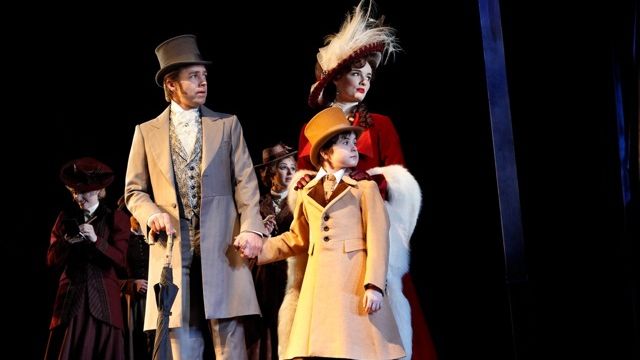Simon Gleeson: The Dark Side of Raoul
Simon Gleeson plays Raoul in the Australian production of Love Never Dies, now playing at Sydney’s Capitol Theatre following its success in Melbourne. He spoke to Neil Litchfield prior to the Sydney opening.
After working in London for several years, Love Never Dies sees the WAAPA graduate back in his first substantial musical theatre performance since returning to the Australia.
Time hasn’t been kind to poor dashing Raoul since the first installment of Phantom, I suggested.
“What I remember of Raoul from the original Australian production is that he was your archetypal romantic lead, Simon replied. He was dashing, and kind of wet, to be honest.
“Although they can be good fun, romantic leads are often difficult to play because they’re two-dimensional. The best thing about Raoul ten years on is that he’s got lots of demons. He is vastly different to the first time, but of course people remember the first, and it’s my job to try and find echoes of the man who he really is, and who we saw originally, without trying to be soft on it.
“He’s a problem gambler, and probably a problem drinker and he’s very hands-off as a father, so there’s a lot not to like about him. My job’s not to make people like him, as long as we can understand why he’s done what he’s done, and why he behave the way he does. That’s all that’s necessary. So I have a great time playing Raoul.”
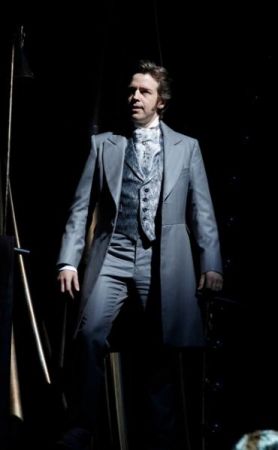 What led you to becoming a performer?
What led you to becoming a performer?
“Jealousy. My sister is an actress, and as kids growing up in Wagga Wagga she would do shows in the area, and I would see her getting people’s attention and interest, and think I wouldn’t mind getting some of that. So it was mainly jealousy, but after that it just turned into something that we both loved.”
And studies at WAAPA followed.
“Going to WAAPA wasn’t something that I planned. In fact it was another actor that you’d know, Matthew Newton, who I remember phoning me up and saying that he’d signed my papers and paid the money for me, and saying, ‘all you’ve got to do is turn up.’ Now I’m really glad I did.
“We’ve got lots of people in our cast from WAAPA, Ben Lewis (The Phantom) being one of them. I really loved my three years at WAAPA. I met my wife there, so it was a very happy time.
What was your first break after WAAPA?
“My wife and I were quite lucky that we got cast in Les Mis. There were only two spots up for grabs in the tour that was already underway, and we got cast in that together, so we left just before the end of our third year. We were really, really blessed.
“So I started in musicals for quite a while, but I wanted to try other things, so I went to the Sydney Theatre Company and did a play, and from there it was off to London.
“I feel like we’ve only just gotten back from London, though it’s been a couple of years now.
“I started off mainly in musicals, but it just kind of grew from there. I realised soon after doing Mamma Mia, that I really wanted to do new work, new Australian work or just originate work, instead of doing work, like you do in musicals a lot, which comes from overseas. And that’s what happened. The next six years was about completely original work, first in Australia and then in London.”
How did working in London come about?
“It came about through Gale Edwards. She was doing a show called Eureka in Melbourne. That wrapped up early, and Gale said she had a project in the West End on a new musical, The Far Pavilions. For some reason they couldn’t find anyone to play the quintessentially British officer, so she said I should put an audition DVD down, and just pretend I was British. She showed it to the producers, and they brought it, so I flew to London. I was always going to go, because my wife had been there for a few months.
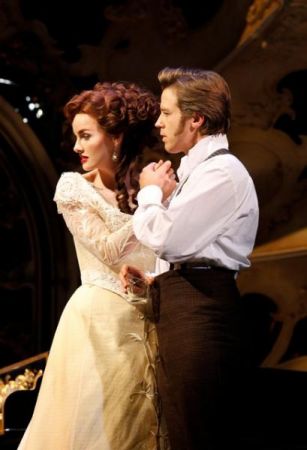
“That was an amazing time; just to be able to walk in and have a very quick leg up into the British industry. From the time you come unknown from Australia, it takes a bit of time to get in there, and it just made things a lot easier for the five or six years that we were there.
“I absolutely loved my time there, and the beauty of it was the diverse projects. There were times when I was doing quite a long contract in EastEnders, of all things, and at the same time doing a play for the Royal National Theatre, and on Sundays doing a musical, and that’s unheard of here, really.”
What led to your return to Australia in 2009?
“It was family really. We had a daughter over there, and it was just time. London is a difficult place to bring up children so we came back for lifestyle – it certainly wasn’t a work decision. It was a good one, and I’m very glad we made it, but it was very difficult to say goodbye. My parents live in England, so it was a little bit more difficult for me to leave. I went back last year last year to do a show for three months for Sadlers Wells, and it’s just nice to go back and visit friends.”
What did you do back in Australia, prior to Love Never Dies?
“When we came back, it was more introductory work, like bits of TV and that kind of thing, to say, ‘well I am actually back.’ There’s a certain amount of re-introducing you have to do. I know my wife actually came back to do some projects while we were living over there, but it’s a matter of saying we’re actually back for good, instead of just being back for a short amount of time. So I did some smaller musicals in Melbourne, and then the bigger projects ended being back in London.
“That’s one thing nice thing about Lover Never Dies, it’s a project that has kept me here for a good amount of time.”
What was the lead-up, for you, to Love Never Dies?
“I was doing a project in Tasmania when we were auditioning so I was flying up every few weeks for that. Simon Phillips just makes auditioning very easy; he’s very relaxed. You don’t have that stressful atmosphere, so it was always a joy to go in.
“And then knowing that Andrew Lloyd Webber would have a part to play in putting it all together was also a big drawcard.
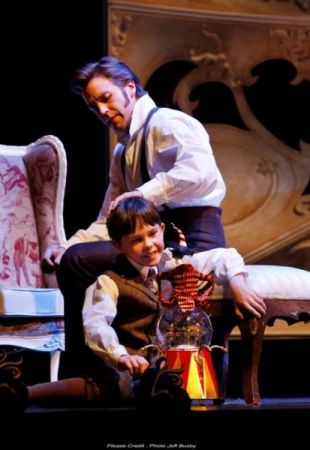
“For me a big part of doing the project was working with Simon – it’s a hell of a lot of fun. We’re very blessed with a very nice cast of people, so the whole process has just been so much fun. I really enjoyed them, and really enjoyed Melbourne.
“It’s going to look beautiful in the Capitol, which is just perfect for it. Then in early February the DVD comes out, which is such a coup for Australia and Australian creatives and actors.”
So many performers I interview tell me how good Simon Phillips is to work for. Can you crystallise what it is that is so great about working with him?
“I’m almost loathe to give my take on Simon, because this project is so much different to doing say Hamlet or Julius Caesar, or even another musical that is already pre-existing. We did so much work and rewrites, so the process was slightly different because it was originating the work, as opposed to having a finished production and going well this is what we are doing. There was never any certainty, which is what I really enjoyed, that the next day you’d come in and things hadn’t changed. Things were always changing.
“Simon is also very good at managing people, so it’s not just about being creatively there and intuitive, it’s also about managing different personalities, and having an eye for what different personalities need. You just can’t ruffle the man, so he’s got a great feel for the process, and he was always two steps ahead of what needs to happen. He’s great at getting what he wants but being open and malleable enough to be influenced by the cast. And of course, he just makes you laugh, and the value of that can’t be underestimated. When people are trying things, and are nervous, and putting themselves out there physically and emotionally, you need to know you’re in an environment where that’s going to be supported. People will go out of their comfort zone, challenge themselves, and come up with something which they didn’t even know was possible because he’s providing that environment.”
What do you enjoy most about playing Raoul?
“If there’s a villain he’s it, but he’s not your usual cloak and dagger villain. He’s not the nicest person, and I think that’s really interesting in musical theatre, where you’re often used to seeing mostly nice people. Also, the further I go into the first act, the way he behaves means the harder I have to work in the second act, where he has to try to redeem himself, and he does in a way. So there’s a wide arc to play, and that’s always fun. I also get to have a bit of a blue with the Phantom, and that’s fun too, because you don’t often see men in very masculine fights through song.
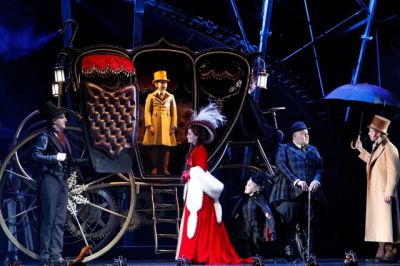
“Playing it is very different each night, which is always good. This piece is completely sung through, with not a lot of straight dialogue. Often with sung-through pieces, with the conductor in control of everything, you can feel like it has to be very much the same every night, but we’re very lucky with Guy Simpson, and the piece itself lends itself to being different each night. There’s room to move and room to breathe and room as a performer to be in control of the pace of the scene. That’s gold.
“What I quite like about the company doing this show every night is that there is no resting on their laurels. There’s debate and conversations going on every show about how to make it better. When you have a hand in originating something, and there was a production in London but this is just so vastly different, and you’ve got a hand in changing it from Day One, you don’t fear changing it 220 times in to make it better. We’re talking about tiny changes, obviously. Everyone’s very dedicated to fine-tuning it.
What little things about Raoul and your performance of him have you found as the show has run?
“For me the whole thing has been about balance. It’s how far can you go before it’s too far and he becomes so unlikeable, or how far can you go the other way without completely watering him down. When you’re doing a long run, often there will be a look that someone gives you, or a touch or something – they’re tiny moments when seen on stage, but there are little moments that are found as long as actors remain curious, and no matter how tiny, they might make your show because things live afresh. So I definitely try to mix it up a lot, without moving far away from what we’ve originated. Often these things are tiny, but they’re surprising, and I just love talking about this curiosity – and this cast has remained curious about this project, which means that it is always evolving and interesting.”
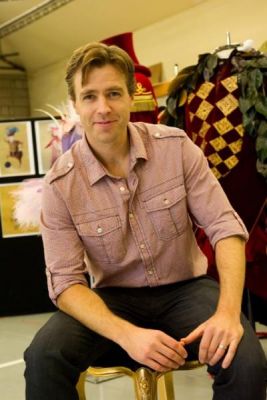
Raoul doesn’t sound like a particularly likeable character this time around, but do we come on a journey and find some empathy with him?
“I hope so. It’s certainly in the text and in the show that there’s understanding, and therefore a degree of empathy for this man, who has chosen the wrong path, and has made some bad decisions. The idea is that he is still very much in love with his wife. It’s about laying that bare, and if I’m doing it properly, then yes, there will be, if not empathy, at least understanding of why he’s made the choices he’s made.”
Love Never Dies opens at Sydney’s Capitol Theatre on Thursday on Thursday January 12, 2012, following previews from January 9.
Production images by Jeff Busby. Adjacent photo of Simon during rehearsals: by Kurt Sneddon
Further coverage
Behind the Phantom mask: Our Interview with Ben Lewis
Brand New Australian Production for Love Never Dies
Love Never Dies – Inside Rehearsals
Love Never Dies - Sydney Review
Love Never Dies – Melbourne Review
Sharon Millerchip (Meg Giry) interviewed
To keep up with the latest news and reviews at Stage Whispers, click here to like us on Facebook, or follow us on Twitter.
Subscribe to our E-Newsletter, buy our latest print edition or find a Performing Arts book at Book Nook.

